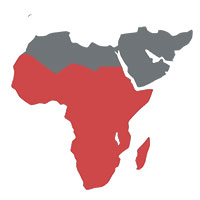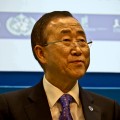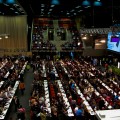Where are the goal posts? Day 3 at COP17
admin | December 1, 2011.
It was business time at COP on day 3, as dozens of informal meetings took place and the plot of COP17 began to take shape, with the developing/developed nation divide rearing its ugly head and the issues of finance finally arriving in Durban. Meanwhile further affirmations of the climate crisis were made.
China kicked things off by criticizing Canada’s “bad example” in the Chinese government’s official news agency, Xinhua. The piece claimed that China saw Canada’s withdrawal, and its reluctance to confirm or deny, as hurting the international efforts to combat climate change.
The European Union (EU) then surprised everyone by renouncing its previous approach to climate negotiations, and taking a hard line stance on the possibility of a new global treaty. They insist they will not partake in any new treaty unless the developing world is also bound to curb emissions.
Turning away from the governing principle of Kyoto—common but differentiated responsibility—the EU has instead adopted the principle of ‘legal parallelism’ to guide the future architecture of the climate regime. The EU (and by implication, developed countries) will only sign up to enforceable emissions reductions if developing nations do as well.
It’s a stance which brought EU in head to head conflict with the BRIC nations of Brazil, Russia, India and most vocally, China.
In an interview with the Guardian, the Polish presidency of the EU denounced the previous “dovish” stance of the EU in climate negotiations, and hit out at critics by arguing the EU has always led the world. Now other powerful nations have to take the lead, they said. For these efforts, Poland won fossil of the day.
China reacted negatively, saying the EU was shifting the goalposts. In response, the EU made reference to the 2007 Bali roadmap and the failed 2009 Copenhagen negotiations—where the breakdown in negotiations were widely attributed to China,
“The goal posts shifted already and not by EU,” said Artur Runge Metzger, the EU’s top negotiator.
Yet China made a positive step by announcing despite the EU stance, “developing countries are also open and ready to talk to [the EU] about how to address this issue.”
In the afternoon the long awaited issue of finance finally reached the COP, as the report from the Transitional Committee for the Green Climate Fund (GCF) was presented to the COP. The ALBA group, a small coalition of Latin American socialist countries, had made clear they would not allow the draft governance to go through without amendment—and to their credit, they stuck to that word.
Many countries supported the adoption of the draft, despite its widely acknowledged flaws, in the interest of getting the GCF running as soon as possible. But ALBA along with Saudi Arabia and with ambiguous support from the Philippines speaking for G77 and China, insisted it was unacceptable.
ALBA expressed concern over elements of the governing instrument which they felt might “hinder democratic access to resources,” and pushed for the GCF to have legal status, be under the guidance of the COP and ensure no conflict of interest in the trustee position.
The South African COP presidency, again displaying inspired leadership, proposed to conduct informal consultations to find a decision agreeable for all parties, and pushed that decision through, although was subsequently challenged by the Philippines, ALBA and Saudi Arabia, who demanded clarification on procedural matters.
The USA also raised a few eyebrows by declaring that there was no scope in the Cancun Agreements to increase 2020 pledges and that no country was willing to do so.
Meanwhile, Rajendra Pachauri, the UN’s top scientist, warned negotiators that global warming was increasing human harm and financial costs. The strong implication was that time is running out. He warned that intense heat waves occurring every twenty years will become the norm by 2100, and that rain-reliant agriculture in Africa will shrink by half—leaving 250 million more people facing water scarcity.













comment